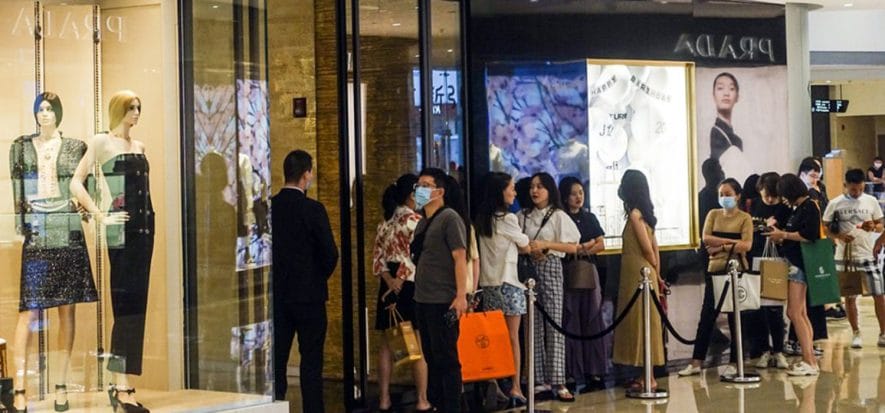China reassures luxury. Consequently, fashion brands adapt and tailor their own strategies and (also) their products to meet and fulfil Chinese buyers’ demand. Encouraged by “revenge spending” and unable to go shopping and make purchases abroad, Chinese customers pile out into the nearest selling shops and department stores. Therefore, retailers do not face any crisis as, conversely, revenues go up.
China reassures luxury
According to estimates, provided and made public in June by Boston Consulting Group, luxury global sales will supposedly drop by 25 to 45% throughout 2020. In contrast, in China sales will expectedly increase by 10%. “All major brands have been enjoying a boost in sales, in China, in the last few months”, pointed out Jason Yu, Chief Executive Officer of Kantar Worldpanel Greater China, while speaking to the South China Morning Post. A reassuring remark indeed, based on quarterly revenues made by all high-end players: from LVMH to Kering, including the latest statements released by Prada.
Ability to adapt
While taking benefit from such opportunity (the only one brands can grab for the time being, along with online sales), fashion houses have been reorganizing themselves to meet and fulfil Chinese buyers’ demand and needs. Which also implies, in many cases, an adaptation of their products. “I believe that Chinese market is big enough to justify whichever product adjustment”, claimed Yu. “An effective approach, which may apply to all players, is less likely to be successful in the end”, therefore stressing the fact that each fashion brand had better do things its way. Furthermore, considering how widespread China’s market is, it could be a valuable testing ground for new collections.
Retailers’ revenues go up
Thanks to such positive trend, Chinese retailers happily smile. Daily newspaper MF Fashion explained the reasons, pinpointed by some analysts and insiders. Guia Ricci, Boston Consulting, emphasized that, since Chinese buyers cannot travel abroad, they consequently go shopping and make their purchases in China. Christina Fontana, Europe fashion and luxury chief supervisor at Alibaba, disclosed one of their trump cards: “A perfect integration of online and offline sale channels. In other words, they use digital channels to support the physical ones”.
Aspirational shopping
Luca Solca, financial analyst at Bernstein, illustrated two more factors: “a vast majority of locations in the city centre and better relations with the fashion label”. Swetha Ramachandran (GAM Luxury Brands Equity) emphasized that Chinese economy is younger, compared to other markets, and, in addition, may benefit from aspirational shopping. In other words, Chinese malls better meet and fulfil local Millennials’ demand and their omnichannel shopping/payment method. Not to mention, though, that in China most shopping malls belong, in part or totally, to Chinese government”.
Picture taken from globaltimes.cn











